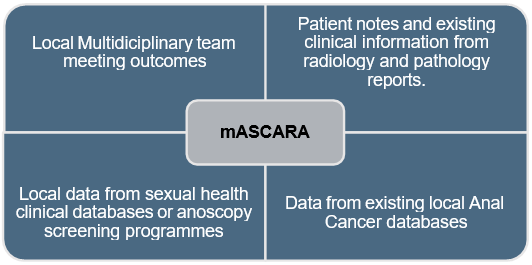Introduction
Anal Squamous Cell Carcinoma (SCC) is an uncommon cancer with an incidence rate between 1 and 2 per 100,000 per year. The incidence of anal SCC is increasing rapidly, with an overall 63% increase in incidence rate in the UK since the 1990’s. However, there is much discrepancy in best surgical practice for its treatment and prevention.
As anal SCC is a rare cancer it is difficult to gain sufficient patient numbers with enough statistical power to be able to provide evidence-based conclusions on best practice. Regional guidelines differ considerably and there is widespread variance in practice between different clinical centres.
Although generic cancer databases such as Cancer Outcomes and Services Dataset (COSD) in the UK and the National Cancer Database (NCDB) in the USA exist they are limited to the data streams that are available to them. Both cannot link, for example, to HIV status or outcomes related to Anal Squamous Intraepithelial Lesions (SIL) (the precursor to anal SCC). Neither can they report treatment regimes and recurrence rates. It is likely that the increasing incidence is related to, at least in part, the increasing prevalence of HIV therefore not including this data is a significant confounding factor.
In order to provide a suitable platform to allow further dedicated study into anal SCC, we have developed an international Anal Squamous Cell Carcinoma registry; mASCARA.
What is Multinational Anal Squamous Cell Carcinoma Registry and Audit (mASCARA)?
mASCARA is a secure web-based platform that has been available to use since May 2019. It has been designed to be GDPR compliant and has gained ethical approval from a specialist GDPR database Research and Ethics Committee in the UK. Data is pseudo-anonymised to submitting direct care teams (to allow outcomes such as survival and recurrence to be updated by the direct care team over time) but is fully anonymised to the study group.
We are rolling out the platform to clinical centres who wish to include their retrospective and prospective data voluntarily. Our aim however would be, similar to other schemes like the National Bower Cancer Audit in the UK, to gain endorsement from regional Colorectal associations for international mandatory adoption.
Method
We are requesting the submission of retrospective anal SCC or high-grade SIL (HSIL) patients as well as the prospective recruitment of patients with newly diagnosed with anal SCC or HSIL.
Any patient diagnosed with anal SCC/HSIL before 1st January 2019 is defined as a retrospective patient and will not need to be consented to be included in mASCARA.
However, prospective patients will need to give their informed consent prior to their inclusion in mASCARA. A prospective patient is defined as any person diagnosed with anal SCC or HSIL after 1st January 2019. An example consent form and patient information leaflet has been provided within the study documents.
HSIL will be defined as patients with histology specimens classified as:
- AIN2
- AIN3
- Moderate Anal Intraepithelial Neoplasia.
- Severe Anal Intraepithelial Neoplasia
- HSIL (High grade squamous intraepithelial lesion)
Once registered to take part, local Research and information governance approval will need to be completed at the new clinical site.
Inclusion Criteria
- Any patient (male or female) over 18 years old, with or without HIV, with a histologically confirmed diagnosis of anal HSIL or SCC
Exclusion Criteria
- Patient under the age of 18 years
- Prospective patient (diagnosed after 1st January 2019) that refuses informed consent
- Prospective patient (diagnosed after 1st January 2019) that does not have the capacity to consent to be take part.
- Patients with histology other than Squamous Cell Carcinoma
Primary Objectives
- Investigate demographic risk factors of patients with anal SCC
- Determine risk factors for anal SIL progression to SCC
- Investigate best treatment for patients with multi-focal low-grade disease
- Compare end outcomes of different anal SCC and SIL management guidelines from different centres
We expect there to be many more potential objectives and have gained generic approval from the Research and Ethics committee to use the data collected for any relevant scientific research related to anal SCC.

Access to mASCARA
After successful registration and local research and Information governance approval. A password protected account will be provided to registered members of the direct care team. If you have a large dataset already available electronically, contact the study coordinator as it may be possible to upload the dataset directly.
Study Co-ordination
The day-to-day management of mASCARA will be coordinated through the Study Co-ordinators. If there are any further questions regarding mASCARA please use the Contact Page on this website.
Withdrawal Criteria
Patients with their data included after informed consent can request to be removed at any point in the study and, if possible, their data will be discarded.
If a patient asks to be withdrawn the direct care team will be informed and asked to identify the randomly allocated patient identification number from their pseudo-anonymisation list. The patient data can then be deleted by an administrator.
However, as analysis will be randomised, it will be impossible to delete data from previous downloaded versions of the data and previous analyses. The patient information leaflet clearly explains that depending on the time of the request we will be able to delete the patients record from the database but may not be able to prevent their data being used in analysis.
Funding
mASCARA is supported by the Red Trouser Day Charity.
